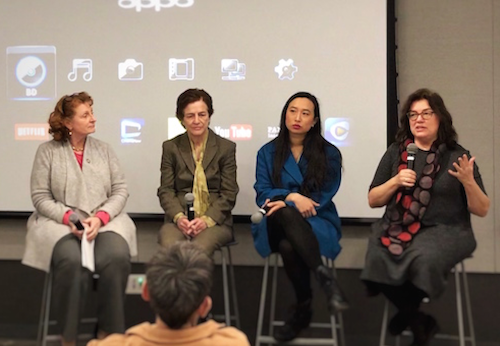Assemblywoman Jo Anne Simon (D-Brooklyn Heights, Downtown Brooklyn, Cobble Hill, Carroll Gardens, Gowanus, Park Slope, Boerum Hill, DUMBO) hosted a film viewing and discussion of She’s Beautiful When She’s Angry on the eve of New York’s second Women’s March to reflect on the position of women in the country and state.
The film covered the history of the women’s liberation movement in the 1960s and some of the women involved in second wave feminism. While the film celebrated some of the movement’s accomplishments, the discussion afterward focused on the reasons that women can’t become complacent.
Joining Simon after the film showing for a discussion were the film’s director and producer, Mary Dore, Assemblywoman Yuh-Line Niou (D-Lower Manhattan), and former Kings County District Attorney and former Congresswoman Elizabeth Holtzman.

“The Assembly and State Senate is only 27% women. When I was first elected three years ago it was 23%,” said Simon
The film covered the history of the women’s liberation movement in the 1960s and some of the women involved in second wave feminism. While the film celebrated some of the movement’s accomplishments, the discussion afterward focused on the reasons that women can’t become complacent.
As recent as three years ago when Simon joined the assembly and Niou was in Albany as Assemblyman Ron Kim’s chief of staff, they described a culture that didn’t fully respect women, even as their numbers in the legislature was growing.
“There was a hot or not list. Apparently, I was on it. That was really disturbing. When I first started working for Ron, five dudes would just come and peak their head into the office, but wouldn’t come in,” said Niou.
As a result, they stress the importance of having more women in Albany in order to change the culture and the conversation. As more women have gotten seats at the table Simon and Niou argued that you can see the changes in the happening, from tampon machines in the bathroom to legislation such as requiring medical assistance coverage for the cost of donor breast milk or paid family leave.
While there has been progress, everyone was also concerned about the backslides in recent years, especially when it comes to reproductive rights. Holtzman recounted a brief that she was asked to write in 1971 to New York State’s highest court declaring the abortion laws unconstitutional.
“I said when you force a woman to carry a child to term against her will, isn’t that really a form of slavery. And isn’t this barred by the Thirteenth amendment. And I still think it is true. The idea that a woman still can’t make a decision about her own body… well what can we make a decision about if we can’t make a decision about our own body? How do you except us to make a decision about anyone else? Why do we have the right to vote? Why do we have the right to think?” said Holtzman.
In creating the film, Dore tried to tackle some of the stereotypes of feminists such as that they hate men, do care about child care, and that they were all racist. The film interviewed a number of women who were inspired by and learned their organizing skills from the civil rights movement, like Holtzman herself. Within the feminist movement as a whole, the film and the panelists discussed the importance of recognizing that certain voices are being dampened or not being heard at all, specifically women of color and the LGBTQ community.
Moving onto the upcoming Women’s March, Simon spoke about her excitement and the importance of demonstrating.
“[Last year] it was great to have these pink hats so you could see the areal footage. You could tell, we could tell how big the crowd size was unlike someone else,” she said taking a shot at the President.
She continued, “We need to keep talking to people, because social media is great but it is really when you are talking to people that you change people’s minds, you get people involved however that is. We need to be role models for other people in our lives, whether we even know it or not.”










